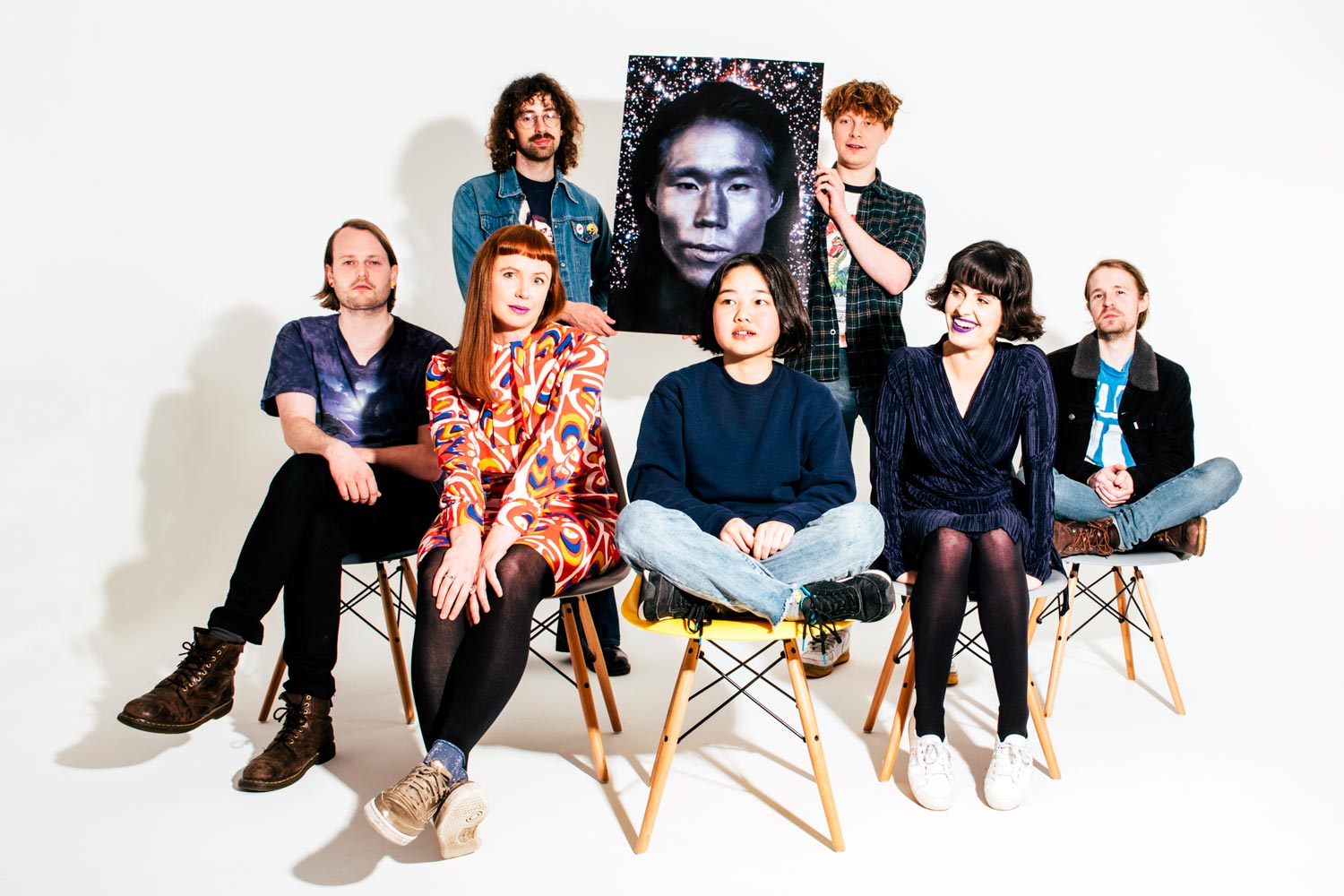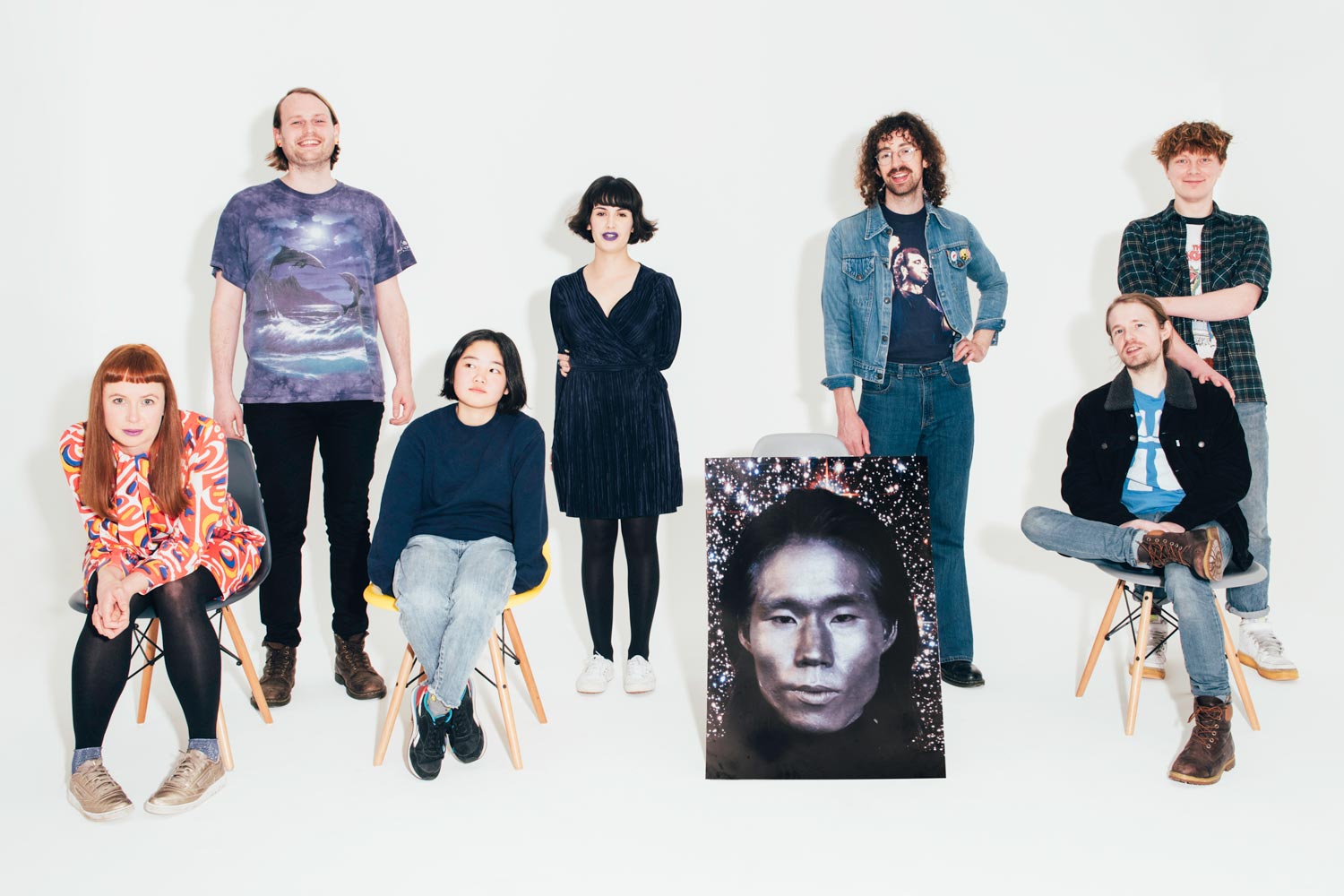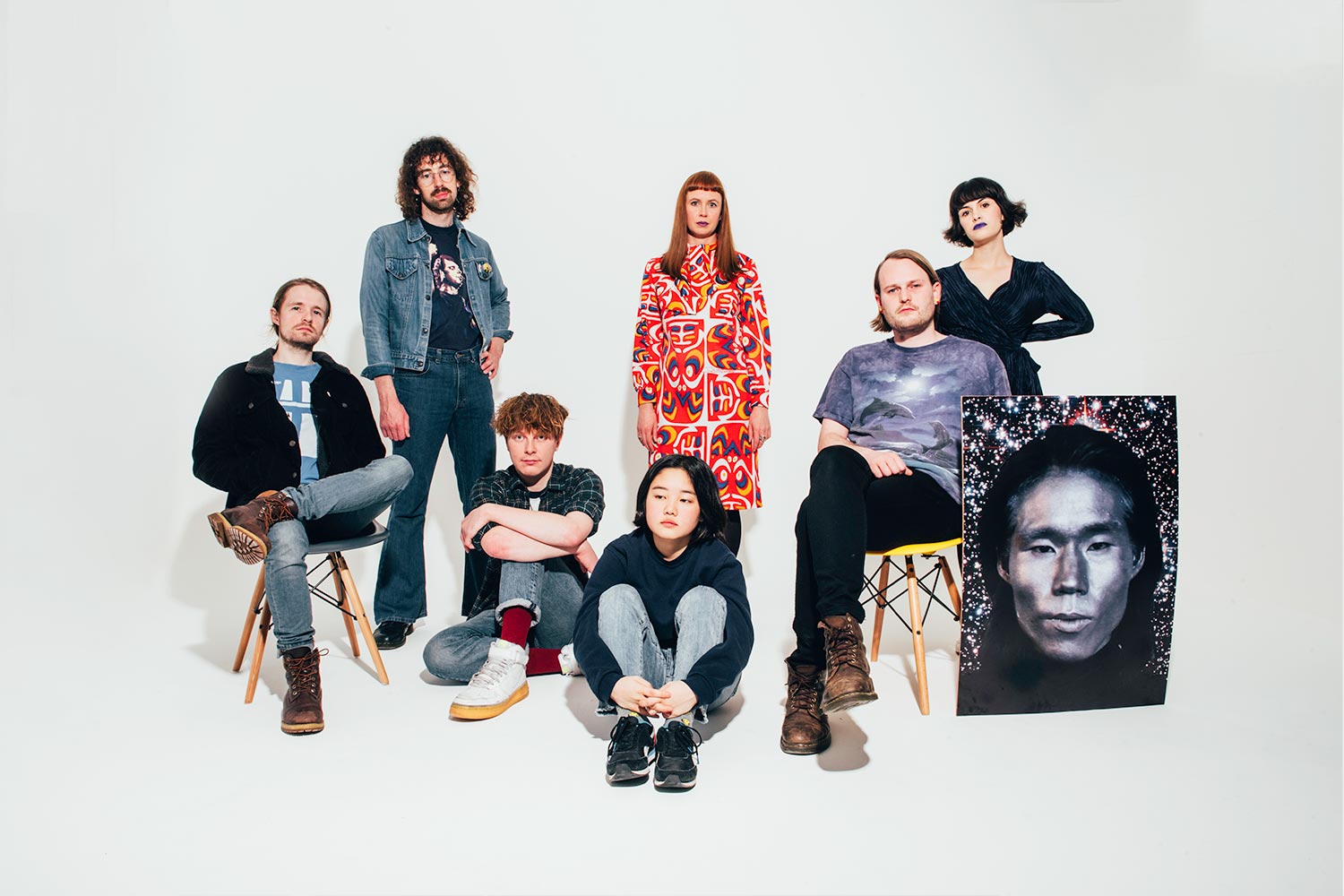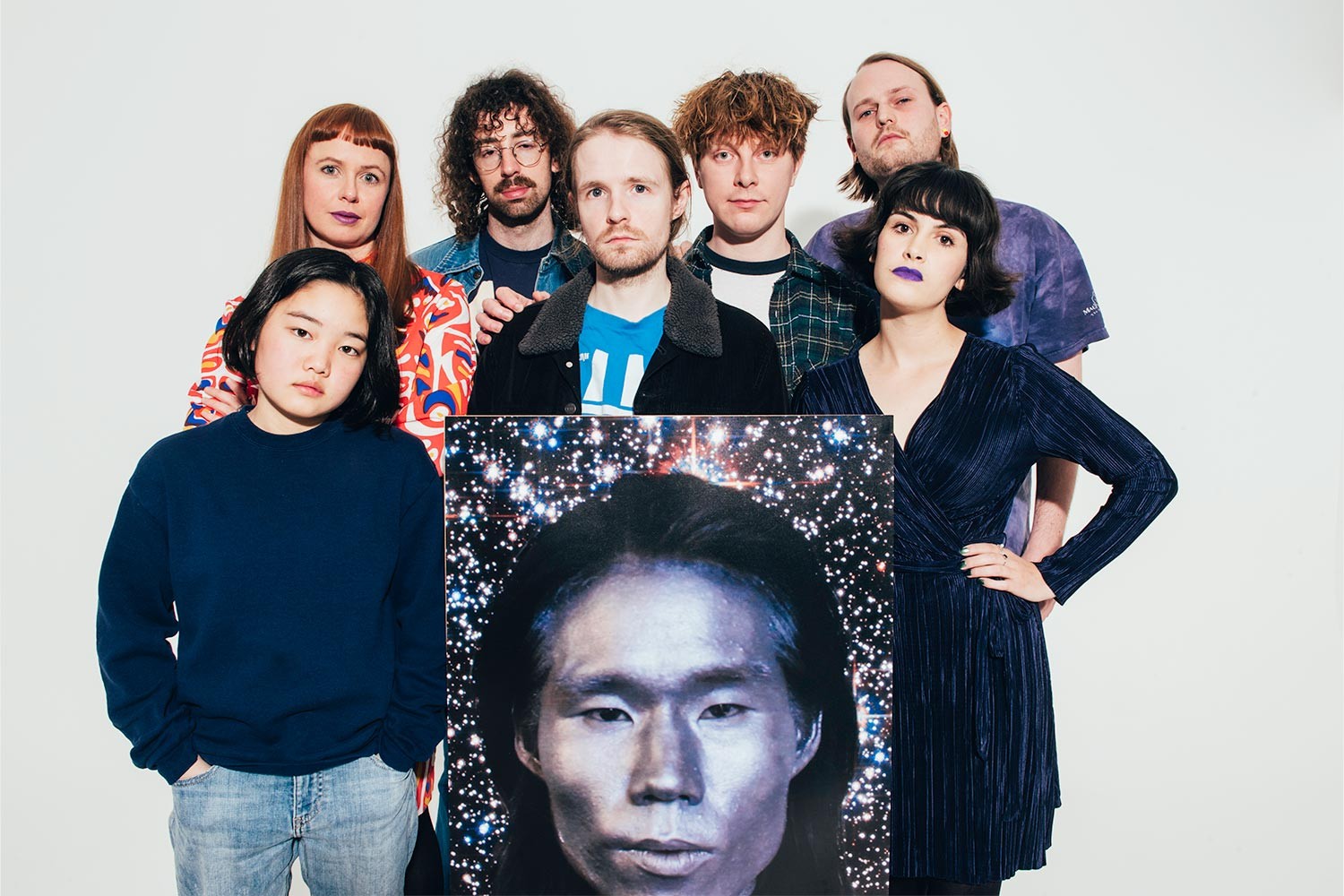There’s a new hive mind in town. In early 2017, Superorganism’s first single ‘Something For Your M.I.N.D’ appeared online. It’s difficult to say what that was like because what Superorganism do isn’t like anything else. It’s like trying to compare apples and oranges – only the oranges are neon and hexagonal, and don’t actually seem like they come from this planet at all. ‘Something For Your M.I.N.D’ was sharp and shiny, hyper-modern and so fizzingly delicious that you wanted to live inside it. Then it disappeared. Some problem to do with an uncleared sample. After that came two more singles, ‘It’s All Good’ and ‘Nobody Cares’, before ‘Something For Your M.I.N.D’ resurfaced and was finally joined by a fourth single towards the end of last year.
That final track in 2017, ‘Everybody Wants To Be Famous’, was the band entering warp speed. It’s fantastical and bubbling, and was launched with a video by Superorganism’s visual artist Robert Strange that features 17-year-old singer Orono traipsing through a digital universe of the band’s own making. Like their earlier clip for ‘Something For Your M.I.N.D’, the video paints Superorganism’s world as a computerised, animated realm filled with cartoon animals and video game style quests. It also includes a mocked-up faux YouTube called ‘Dank Videos’ where faceless commentators spin the conspiracy theory that Orono is actually a hyper-realistic hologram.
In an interview on Channel 4 news not long after the video’s release, Robert Strange joked that the band are ‘quite a cartoonish group of people’. He wasn’t wrong. Robert himself looks like he’s wandered out of the 70s, all long hair and double denim. Then there’s guitarist Harry’s wild mop, a drummer called Toucan, plus synth player Emily, today dressed in a purple t-shirt featuring a pair of leaping dolphins and earrings in the shape of McDonald’s fries. Not to mention the minuscule Orono, and joyful, cackling backing singers Ruby and B with their shockingly purple lipstick. A motley crew, and that’s before we even get to the fact that third backing vocalist Soul is out of the country and has sent a portrait of himself as a stand-in for today’s shoot. The members of Superorganism just keep coming, like clowns piling out of a battered old Volkswagen Beetle.
The usual gang is whittled down to just two for today’s chat. Emily is excitable and expansive, the ideas rushing in from all directions as he speaks. Orono, on the other hand, is droll and sharp-witted despite the crushing weight of her Japan-London jetlag. She is also definitely a tiny Japanese teenager, and not the result of some clever digital trickery. We think. The hologram thing wouldn’t be such a huge stretch, though, considering the fact that for a long time Superorganism’s work was all conducted in the virtual world.
“It was all over Facebook at one point,” Orono explains. “When we started initially. Emily sent me a message the day after my 17th birthday just like, ‘Hey, we have a demo of this song, do you wanna write some lyrics and sing on it?’. I did that; it was like a Sunday morning or whatever. My roommate was sleeping so I sang very quietly, it was a bit of a lullaby vibe I think. We did that for several months.”
[sc name=”pull” text=”We became buddies after a show. Then we went to the zoo the following day.”]
That lullaby became ‘Something For Your M.I.N.D’. By the time Orono chimed in on the demo, most of the rest of the band had moved to London and were piled into a terrace house together, but the internet was still crucial to their work. Emily and Orono had met in person a few years earlier, after Orono went to see a previous incarnation of the band play in Tokyo. And even then, the meeting only happened because Orono had been digging around on the internet.
“I found their music through YouTube recommendations,” she says. “The algorithm worked.”
“The algorithm put us together, man,” Emily says with a grin.
“Then I found out that they were doing a little tour in Japan. I went to their gig in Tokyo, and we became buddies after the show. Then we went to the zoo the following day.” She pauses. “And the Hard Rock Café.”

It’s not what you’d call the classic Tokyo tour, the zoo and then the Hard Rock Café, but Superorganism delight in the weird.
“It just felt right, y’know?” Emily laughs.
After their Japanese tour and zoo excursion (“the Jack-Ass Penguins were the best ones,” Emily says), they stayed in touch thanks to the wonders of social media. Then, when Emily noticed Orono “had a couple of cool demos up on Soundcloud”, collaborating on ‘Something For Your M.I.N.D’ seemed like the natural next step.
“[Soundcloud demos are] just classic teenage bullshit nowadays,” Orono smirks. “Actually, my Dad was like, ‘You should take those down right now ‘cause they’re embarrassing’.”
“Oh, what! I reckon they’re cool man, don’t do it.” Emily insists.
“I was like, ‘I know. I’m already onto it, several months ago’,” says Orono.
Emily’s always had faith in Orono, by the sounds of things. The first time the rest of the band heard her work on their first single, it blew them away.
“So we sent this track to Orono while she was at school in the States, and when we got it back we put it on the stereo, and we were just like, ‘Whoa, dude, did you actually just write that?’” he says excitedly. “It was crazy because it only took her an hour or something to write it and record it in her dorm room. It was one of those moments where it just clicks super well, and it was like, ‘Oh cool, let’s do another one, let’s do some more. Let’s just keep doing this; this is fun’.”
By the time Orono graduated high school and moved to London in Autumn 2017, the band had gotten so many tracks down already that their debut album was finished up in a matter of weeks. The influence that their online origins have had is impossible to separate from the finished record. There are markers of it everywhere – in the lyrics and sounds they choose to sample, in their artwork, their videos. It’s clearest on their track ‘Reflections On The Screen’, which nods to online relationships and takes a look at the way that so many of our interactions now play out in spaces that don’t physically exist. This is no futuristic Black Mirror-style dystopia, though. True to their nature, Superorganism are much less bleak about the whole thing.
“It’s a major part of everyone’s lives, right? I think that’s one of the most relatable songs on the record, because everyone’s on their phones and laptops nowadays just looking at bullshit,” Orono shrugs.
That casual, catch-all ‘bullshit’ seems like the right word for it. Practically all recorded human knowledge is at our fingertips, and what are we doing? Looking at dog memes. Playing that one GIF of a seal spinning around to jewellery box music on repeat. Orono’s not preaching, though. This is just modern life, and Superorganism don’t seem to think it’s rubbish.
“You might see your loved one sitting next to you watching Netflix in the reflection more than you actually look at them,” says Emily. “Honestly, it’s a little bit like that. I just feel like everyone we know is obsessed with the internet. Not in a weird way that just seems to be modern life. There are all different ways of meeting through the internet these days. Whether it’s finding a job through the internet and meeting people at work or dating through Tinder, and putting music together as well.”
[sc name=”pull” text=”Everyone’s on their phones and laptops nowadays just looking at bullshit”]
Luckily, the 21st-century pop-factory approach suits them down to the ground.
“Putting music together over the internet makes so much sense to us. We love all the mainstream pop stuff, and a lot of people work with a team-writing style of mainstream pop where a few producers will work on a song and then send that file to someone else who’ll work on it and send it on. I’m so fascinated by that because I find it really reflects how modern society works where everyone’s just like putting out something and then people are adding to it. We will walk between rooms and talk to each other when we’re working on stuff [at home], but also chatting online and sending stuff is…” he shrugs.
“It’s just convenient, and we’re very comfortable doing it.” Orono picks up.
“So we tend to do that at all times, yeah,” says Emily. “I remember the first time, years and years ago, I sent my flatmate a Facebook message instead of walking to their room, and we laughed that it was a weird thing to do. It’s such a funny thing to think about now because there’s nothing weird about that at all – to me, at least. I think a lot of internet culture seems scary and even dark and bad at first, and then it just becomes absorbed into normal mainstream culture. Like internet dating, for example, no one would be ashamed to say they’d dated on the internet these days. Whereas in the past I’ve known people who were embarrassed and didn’t want to say ‘I met my partner on the internet’. It’s a different perspective, and it changed so quickly.”
“I told some of my friends at school, ‘Oh I’m meeting up with this friend that I met on Twitter’ and they’d be like, ‘Why would you do that? That is so dangerous, Orono you’re so edgy’, and I was like, ‘What are you talking about?’” says Orono.
The perspectives have changed so quickly that since the early 2000s there have been countless distinct internet phases for the band to draw on, inspiring both their music and their artwork to build their particular universe.
“[Robert] does all the animation and live visuals as well as the video clip stuff. He’s the final piece of the puzzle, so when we’re coming to finishing up the demos for songs he gets involved and starts putting the visuals together as we’re getting the songs finished,” says Emily. “So there’s back and forth like that, and I think he does a great job of painting the words with these kinds of images. He uses lots of images from, like, earlier 2000s internet culture and I think in general he uses lots of memes from different internet eras,” he grins. “The internet eras are very small ‘cause the internet’s only been around for a while. But I think we do the same thing with our music, we’re into all these different eras of stuff, and we tend to get obsessed with these different eras and just take little bits and pieces I guess. That’s the end result.”
Superorganism’s world is one of contemporary nostalgia. The videos for ‘Something For Your M.I.N.D’ and ‘Everybody Wants To Be Famous’ bring to mind early 2000s chat rooms, flip phones, and neon MySpace skins. There are rainbow colours and soaring cat heads, a whale swimming through the sky, 8-bit video game graphics. Superorganism are magpies, picking and choosing the shiny parts of life to weave into their show. They’re rulers of their own retro-futuristic digital realm.
“It’s important to us first of all that we’re in control of all the things that we’re interested in,” Emily says. “That’s why we do everything at home, from writing and recording it, and also mixing it to doing all the visual stuff and then rehearsing the show in our bedrooms. It’s important to us that it’s the expression of our little hive-mind, rather than a collaboration between us and other people outside. We’ve created our hub, you know?
“I think that when you do that, when you have eight people kind of looking inwards, in a way, you start to build this kind of world. It’s inevitable. It’s like when you have this group of friends that always hangs out, and they start to have in-jokes or things like that. It’s sort of like the group starts having a personality, and it’s like that for a band as well. For us, that personality is part of that world.”
“I think that’s why we’re so into creating an immersive project,” Orono agrees, “because we’re so interested in various things all across the board.”
Their varied interests mean that each member of the hive mind weighs in on all aspects of Superorganism. From the lyrics and the melody to song structure, imagery, lighting and effects in their live shows – all members have equal input.
“It’s very collaborative,” Orono says. “Not just lyrics but even the video stuff and the album artworks, the melodies, everything we all have a say in. Emily could come up with some ideas for the lyrics of a song, and he would send it over to me and be like, ‘Hey this part’s cool, or that part’s cool, maybe I could add this cool part that I wrote today’ or whatever. Nobody’s in charge of one single thing.

“I think that’s kind of what sets us apart, ‘cause I don’t think a lot of groups are as collaborative. Usually, it’s one guy, and he’s like, dictating the creative direction of the band, and the other guys just follow. I don’t think we’re like that at all.”
Their equal opportunities, all-for-one approach helps them swerve the pitfalls that might come with clashing egos.
“I’ve seen lots of stories about bands I love where they’ve got multiple songwriters in the band, and they clash and end up breaking up because they want to play their own songs or whatever, and I feel like that’s missing the point,” Emily agrees. “It’s really important to put your ego in the success of the group as a whole, as a team, because in general bands that have crazy good songwriting careers tend to have multiple songwriters.”
“Putting minds together produces amazing stuff,” Orono agrees. “It’s important to put that pride in the whole group. Which I think everyone in our group does, it’s just how we think. If the band’s doing this thing that’s great, then it’s good for every single person. I think that’s how we end up feeling. So in that way, it doesn’t matter who did what and so we end up taking turns doing quite a lot of the different things.”
Collectivism is just the Superorganism way. Everything they do lives up to their name, staying true to their ‘we are one, but we are many’ hive mind approach. They’ve even gone so far as to weave their statement of intent into a theme song on the album; the conveniently titled ‘SPRORGNSM’.
[sc name=”pull” text=”More bands should have a theme song”]
“It’s good to have a theme song,” Emily laughs. “I feel like more bands should have a theme song. I love bands with theme songs. The first one that comes to mind is Devo. They used to play ‘Are We Not Human? We Are Devo’, and they would just play that refrain. Apparently, they would do that for like 20 minutes because they were trying to piss everyone off. I think that’s so great. I love seeing bands that sing about themselves.”
This is the part where their wide-ranging influences really come in.
“Something that blew my mind about rap music, in general, is that it tends to be much more self-referential than maybe indie music for example. The first single of the second album of a rap artist tends to be like, ‘Hey, I’m back!’ literally referencing their place in your life. I find that so fascinating and that’s not really something I’ve seen as many indie bands do. It’s a tricky line to walk I guess, but I love the idea of it being like, ‘Hey, this is us’,” Emily says. “And I guess it’s a bit like The Monkees, we all live in the same house together as well, so I guess it feels apt. That wasn’t the one I was thinking of when we wrote the song I don’t think, but it’s the one I think of now that we live in the same house and we’re all together.”
“Leonard Cohen has a theme song,” says Orono, snapping out of a jet-lag induced daze. “I like that one.”
“I’m trying to think of other bands that have a theme song,” Emily says.
“The Unicorns,” Orono suggests.
“Yeah, the Unicorns have a theme song. Quite a few bands have theme songs.”
Orono nods. “All the good ones.”
That’s not to say that Superorganism are always looking inwards. Their debut album is littered with tracks about the world at large, from social media obsession in ‘Reflections on the Screen’ to the strange panic attack fever of ‘Relax’. Then there’s ‘Nai’s March’, a rumination on climate change, the approaching apocalypse, and our human tendency to carry on in blissful ignorance.
“We’re just mindlessly walking around every day,” Orono says drily. “For example living in Japan or New Zealand you get these fucking gigantic earthquakes all the time, but everyone’s like, ‘It’s fine, it’s cool’, we’re still a functioning society. But when you think about it that’s so stupid. Because you build everything up and it could just fall apart at one point.” She shrugs and smirks a little bit. “That could be a metaphor for your life; I don’t know.”

Emily laughs. “Totally,” he says. “There’s a bit when we play ‘Nai’s March’ live where it kicks in, and there are these synthesisers where it feels like the end of the world, it goes-” he puts his hands out and imitates a deep, earth-rumbling vibration. “That to me is the feeling of maybe standing on top of a skyscraper in Tokyo and seeing the impending doom arriving. It’s kind of disastrous. It’s extreme; it’s theatrical. I love that ‘impending doom’.”
“But with frog sounds,” Orono adds.
Emily nods. “You know, the frogs will be there in the apocalypse.”
Superorganism never get too serious about things. For all their musings on modern life or the approaching end of the world, there’s always a frog sound or arcade game effect to add a touch of buoyancy. There’s a light shining at the end of the tunnel. Take that panicky fever dream ‘Relax’, the penultimate track on their debut album. As Orono sings a cyclic “turn on, tune in, drop out if you can” there’s the sense of someone gently coaxing themselves through an anxiety attack. A sort of one foot in front of the other form of smiling resistance.
“It’s like, it’s that feeling of being on edge all the time. It’s that feeling of impending doom,” says Emily. He stops and considers for a second. “Actually, these songs are quite uplifting, but with any great uplifting feeling, there’s always the down and the up. I feel like we do both of those on the record. The extremes. That’s what we like to do. The extreme lows, extreme highs.”
Superorganism are not in the business of half-arsing anything. Everybody wants to be famous, sure, but they are actually making the trip.
Superorganism’s self-titled debut album is out 2nd March.





